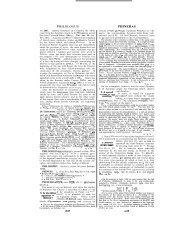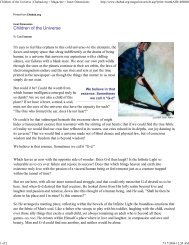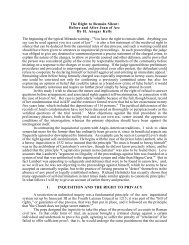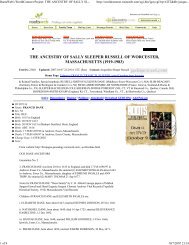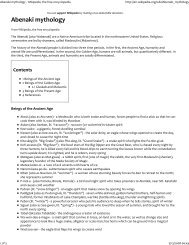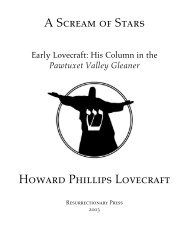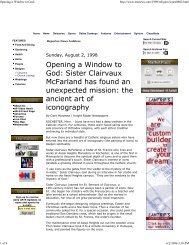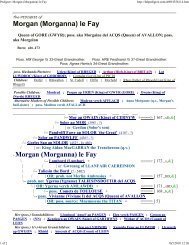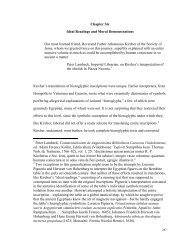Using Nave's Bible Guide - A Kabbalist walks into a bar, and the
Using Nave's Bible Guide - A Kabbalist walks into a bar, and the
Using Nave's Bible Guide - A Kabbalist walks into a bar, and the
You also want an ePaper? Increase the reach of your titles
YUMPU automatically turns print PDFs into web optimized ePapers that Google loves.
various passages of Scripture that bear on this subject. Look <strong>the</strong>m up one after ano<strong>the</strong>r <strong>and</strong> study <strong>the</strong>m carefully <strong>and</strong> see<br />
just what <strong>the</strong>ir teaching is. When you have gone through <strong>the</strong>m you will know far more about prayer than you ever knew<br />
before, <strong>and</strong> far more than you could learn by reading any books that men have written about prayer, profitable as many<br />
of <strong>the</strong>se books are. Sometimes it will be necessary to look up o<strong>the</strong>r subjects that are closely related to <strong>the</strong> one in h<strong>and</strong>.<br />
For example, you wish to study what <strong>the</strong> teaching of God's Word is regarding <strong>the</strong> atonement. In this case you will not<br />
only look under <strong>the</strong> head ATONEMENT, but also under <strong>the</strong> head BLOOD, <strong>and</strong> under <strong>the</strong> head JESUS, THE<br />
CHRIST(DEATH OF). To do this work a concordance is not necessary but it is often very helpful. For example, if you are<br />
studying <strong>the</strong> subject "Prayer" you can look up from <strong>the</strong> concordance <strong>the</strong> passages that contain <strong>the</strong> words "pray," "prayer,"<br />
"cry," "ask," "call," "supplication," "intercession," etc. But <strong>the</strong> Textbook will give most of <strong>the</strong> passages on any subject<br />
regardless of what <strong>the</strong> words used in <strong>the</strong> passage may be. O<strong>the</strong>r passages will be found in <strong>the</strong> section on <strong>Bible</strong> Doctrines<br />
under <strong>the</strong>ir proper headings.<br />
There are four important suggestions to make regarding Topical Study of <strong>the</strong> <strong>Bible</strong>.<br />
1. First: Be systematic. Do not take up subjects for study at r<strong>and</strong>om. Have a carefully prepared list of <strong>the</strong> subjects you<br />
wish to know about, <strong>and</strong> need to know about, <strong>and</strong> take <strong>the</strong>m up one by one, in order. If you do not do this, <strong>the</strong><br />
probability is that you will have a few pet topics <strong>and</strong> will be studying <strong>the</strong>se over <strong>and</strong> over until you get to be a crank<br />
about <strong>the</strong>m, <strong>and</strong> possibly a nuisance. You will know much about <strong>the</strong>se subjects, but about many o<strong>the</strong>r subjects<br />
equally important you will know nothing. You will be a one-sided Christian.<br />
2. Second: Be thorough. When you take up a subject do not be content to study a few passages on this subject, but find<br />
just as far as possible every passage in <strong>the</strong> <strong>Bible</strong> on this subject. If you find <strong>the</strong> Textbook incomplete make additions<br />
of your own to it.<br />
3. Third: Be exact. Find <strong>the</strong> exact meaning of every passage given in <strong>the</strong> Textbook on any subject. The way to do this<br />
is simple. In <strong>the</strong> first place note <strong>the</strong> exact words used. In <strong>the</strong> next place get <strong>the</strong> exact meaning of <strong>the</strong> words used.<br />
This is done by finding how <strong>the</strong> word is used in <strong>the</strong> <strong>Bible</strong>. The <strong>Bible</strong> usage of <strong>the</strong> word is not always <strong>the</strong> common use<br />
of today. For example, <strong>the</strong> <strong>Bible</strong> use of <strong>the</strong> words "sanctification" <strong>and</strong> "justification" is not <strong>the</strong> same as <strong>the</strong> common<br />
use. Then notice what goes before <strong>and</strong> what comes after <strong>the</strong> verse. This will oftentimes settle <strong>the</strong> meaning of a verse<br />
when it appears doubtful. Finally see if <strong>the</strong>re are any parallel passages. The meaning of many of <strong>the</strong> most difficult<br />
passages in <strong>the</strong> <strong>Bible</strong> is made perfectly plain by some o<strong>the</strong>r passages that throws light upon <strong>the</strong>m. Then parallel<br />
passages are given in <strong>the</strong> margin of a good reference <strong>Bible</strong> <strong>and</strong> still more fully in "The Treasury of Scripture<br />
Knowledge," a volume worthy of a place in <strong>the</strong> library of every <strong>Bible</strong> student.<br />
4. Fourth: Arrange <strong>the</strong> results of your topical study in an orderly way <strong>and</strong> write <strong>the</strong>m down. One should constantly use<br />
pen <strong>and</strong> paper in <strong>Bible</strong> study. When one has gone through <strong>the</strong> Textbook on any subject, he will have a large amount<br />
of material, but he will want to get it <strong>into</strong> usable shape. The various passages given on any topic in <strong>the</strong> Textbook are<br />
classified, but <strong>the</strong> classification is not always just <strong>the</strong> one best adapted to our individual use. Take for example <strong>the</strong><br />
subject "Prayer." The classification of texts in <strong>the</strong> topic is very suggestive, but a better one for some purposes would<br />
be:<br />
• Who Can Pray so that God Will Hear?<br />
• To Whom to Pray.<br />
• For Whom to Pray.<br />
• When to Pray.<br />
• Where to Pray.<br />
• For what to Pray.<br />
• How to Pray.<br />
• Hindrances to Prayer.<br />
• The Results of Prayer.<br />
The passages given in <strong>the</strong> Textbook would come under <strong>the</strong>se heads. It is well to make a trial division of <strong>the</strong> subject<br />
before taking up <strong>the</strong> individual passages given <strong>and</strong> to arrange each passage as we take it up under <strong>the</strong> appropriate<br />
head. We may have to add to <strong>the</strong> divisions with which we began as we find new passages. The best classification of<br />
passages for any individual is <strong>the</strong> one he makes for himself, although he will get helpful suggestions from o<strong>the</strong>rs.<br />
There are some subjects that every Christian should study <strong>and</strong> study as soon as possible. We give a list of <strong>the</strong>se:<br />
• Sin [SIN]<br />
• The Atonement (of <strong>the</strong> Blood of Christ) [ATONEMENT]<br />
• Justification [JUSTIFICATION]<br />
• The New Birth [LIFE(SPIRITUAL), SALVATION(CONDITIONS OF)]<br />
• Adoption [ADOPTION]<br />
vii



